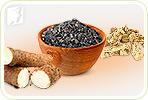
Most women will have experienced vaginal dryness occasionally at some points before menopause. Vaginal dryness in menopause can be a lengthier and perhaps more agitating issue, but it can be treated naturally and effectively. Read below to learn more about vaginal dryness.
When Is Vaginal Dryness Likely to Start?

Not all women suffer with vaginal dryness, and some will never experience it at all. Studies report that 40 - 60% of women who are going through the menopausal transition will develop this symptom. Unfortunately, it is difficult to know when it will occur because women can experience different symptoms at different stages of menopause, and women begin the transition at different ages.
What Are the Symptoms of Vaginal Dryness?
The first symptom is an inadequate amount of moisture in the vaginal area. Vaginal lubrication makes sexual intercourse a more comfortable and enjoyable experience, so if lubrication has decreased, sex may become painful. Light bleeding may even occur. Your vagina might also become itchy, and you might find that wearing certain underwear worsens this problem. Urinating can also irritate or sting, and you will likely find yourself going to the restroom more regularly than usual. It is worth remembering that the severity of vaginal dryness will vary for each woman, and for some, it might just be a mere annoyance.
Why Am I Experiencing Vaginal Dryness?

If you are suffering from vaginal dryness during menopause, it is generally a result of fluctuating hormone levels during this time. Your body is going through a lot of changes, and the imbalance of hormones is causing less natural lubrication to be produced. Usually, during sex or foreplay, a woman is aroused and the brain sends blood to the pelvic area, which in turn stimulates the secretion of fluids. Menopause disrupts this process, resulting in dryness. It is worth noting that other symptoms like loss of libido, stress, and anxiety may add to the problem, so these issues may need to be addressed first.
How Can I Relieve Vaginal Dryness?
You will be pleased to hear that vaginal dryness is one of the easiest symptoms of menopause to treat. Make sure you keep yourself hydrated at all times and avoid large quantities of alcohol and coffee. Eating a healthy and balanced diet is also important.

A regular exercise routine is vital. Take up yoga or an alternative activity that can lower stress levels. Finally, perhaps the most useful tip: try water-based lubricants, which will make sex more comfortable. Don't be embarrassed to buy lubricants and similar products. Instead, be proud - you are a mature woman who is still enjoying an active sex life.
More Information
Vaginal dryness is a normal symptom of menopause, but women often feel embarrassed to discuss it. Don't suffer in silence; there are ways to reduce the effects of this uncomfortable symptom. For more information about vaginal dryness and how to treat it, follow the links below.
Sources
- Love, S. (2003). Menopause and Hormone Book. New York: Three Rivers Press.
- National Institutes of Health. (2013). Vaginal dryness. Retrieved February 26, 2016, from https://www.nlm.nih.gov/medlineplus/ency/article/000892.htm
- Office on Women's Health. (2012). Menopause and menopause treatments fact sheet. Retrieved February 26, 2016, from http://www.womenshealth.gov/publications/our-publications/fact-sheet/menopause-treatment.html


